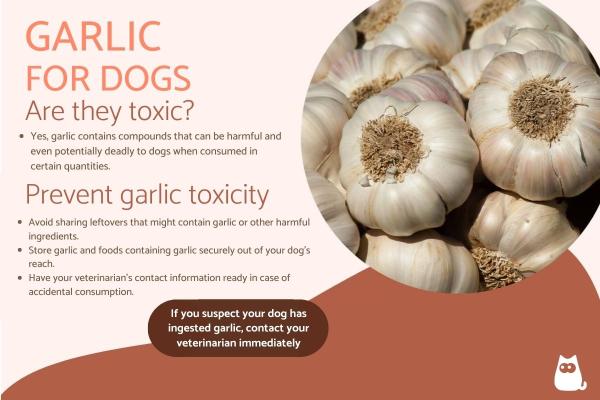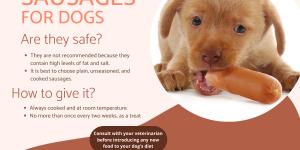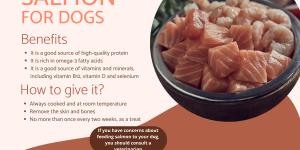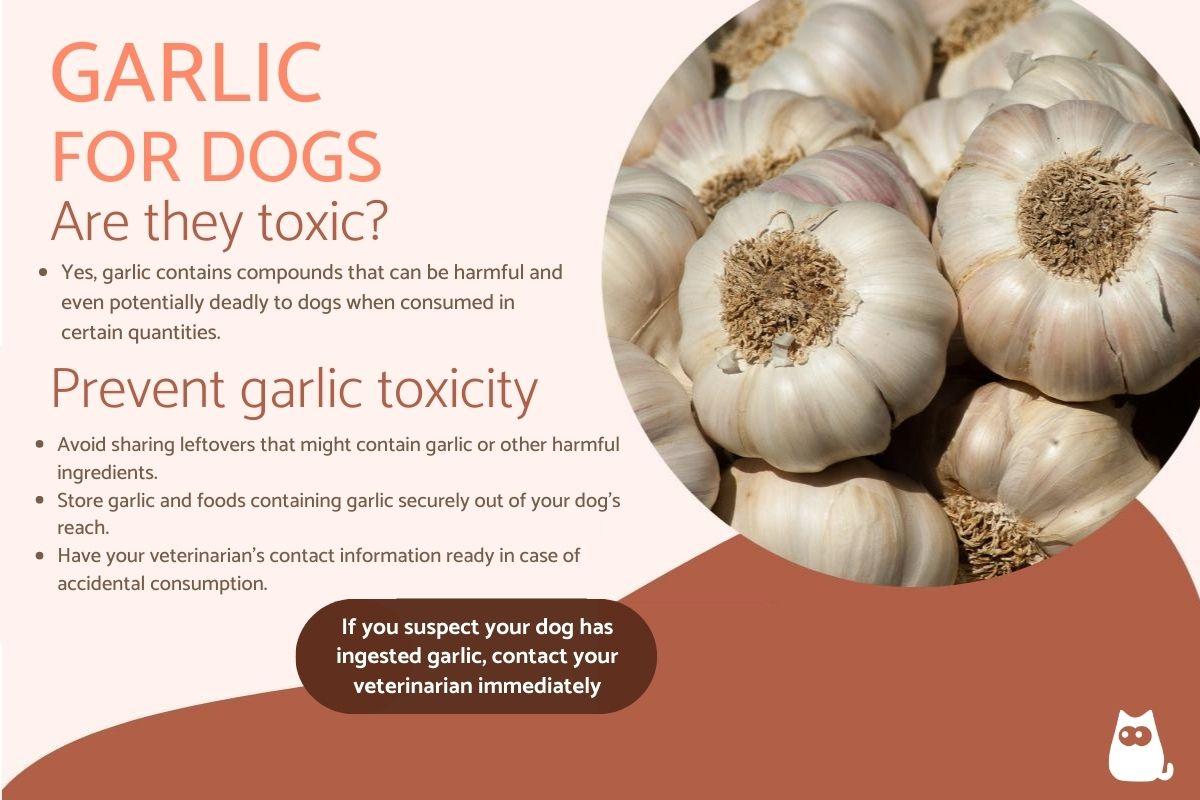Can Dogs Eat Garlic?



See files for Dogs
For millennia, garlic has been cherished not solely for its culinary allure but also for its diverse medicinal attributes. Its profile boasts qualities such as expectorant, antispasmodic, hypotensive, antiseptic, antimicrobial, and anthelmintic properties. However, does this storied reputation extend to our furry companions? Is garlic a safe addition to a dog's diet?
To unveil the truth, we invite you to delve into the following AnimalWised article. We will explore whether dogs can eat garlic and, more pointedly, whether this ingredient poses a toxic threat to our canine friends.
Is garlic safe for dogs?
Garlic is not a suitable food for dogs because its compounds can be highly toxic to their systems.
Around 15 to 30 grams of garlic per kilogram of a dog's body weight is the approximate range that can lead to harmful alterations in their blood. To offer some context, an average clove of garlic from a grocery store typically weighs between 3 and 7 grams. This implies that a considerable amount would need to be consumed by your dog to induce significant illness.
Nonetheless, it's essential to acknowledge that some dogs exhibit heightened sensitivity to garlic toxicity. Breeds, such as the Jindo, Akita Inu, and Shiba Inu, seem to be more vulnerable to the effects of garlic poisoning. This susceptibility might be attributed to higher levels of potassium and reduced glutathione in these particular Asian breeds.
Is garlic bread safe for dogs?
Feeding your dog garlic bread is not advisable. While garlic bread might grab your dog's interest, it generally contains not only garlic but also significant quantities of butter, oil, cheese, and herbs, all of which can potentially lead to stomach issues for your dog.
Additionally, this food provides extra calories and fat that your pet doesn't need, and it doesn't offer any meaningful nutritional benefits. It's best to opt for dog-safe treats and foods that are specifically designed to meet your pet's dietary needs.
Why is garlic bad for dogs?
Garlic is considered harmful for dogs, and it's because of certain compounds it contains. These compounds, like sodium propenyl thiosulfate, propenyl trisulfide, and others, are part of what makes garlic toxic to dogs.
When a dog eats garlic, these compounds are quickly absorbed into their body and turn into strong chemicals. These chemicals react with the dog's red blood cells and damage them, causing the cells to break down. This can lead to a condition called hemolytic anemia, where the dog's red blood cells are destroyed. It also creates something called Heinz bodies, which are not normal in the cells, and methemoglobinemia, which changes how the blood carries oxygen.
Additionally, the dangerous parts of garlic can also affect a dog's heart and blood vessels, making their heart rate change and their blood pressure drop. In unfortunate situations, the damage from eating garlic can even cause the dog's kidneys to fail.
Our informative article offers additional insight into the foods that dog owners should avoid by listing all the prohibited foods for dogs.
Garlic poisoning in dogs
Garlic poisoning doesn't usually show immediate symptoms or appear right after a dog eats it. Typically, the first signs of poisoning take around one to five days to show up. This time delay can sometimes make it hard to connect the symptoms to eating garlic.
When a dog is poisoned by eating garlic, it displays a set of common signs that are typical of an anemic process, such as:
- Pale gums and inner mouth tissues
- Faster heartbeat (tachycardia) and rapid breathing (tachypnea)
- Lethargy and lack of energy
- Weakness and trouble with exercise
- Urine that's darker, reddish, or brownish (due to hemoglobin in the urine)
Furthermore, there might be stomach-related symptoms like vomiting, diarrhea, and belly pain. In severe cases, the dog's gums and inner mouth might turn yellowish (jaundice), and their kidneys could fail. Without timely treatment, the situation could worsen, and the dog might not survive.
For a deeper understanding of these compounds and their toxicity, be sure to explore our related article on garlic and onion poisoning in dogs.
What to do if my dog has eaten garlic?
If you suspect or notice that your dog has consumed even a small amount of garlic, it's crucial to promptly seek veterinary assistance.
While there isn't a specific antidote for garlic poisoning, it's vital to initiate appropriate treatment to prevent the poison from being absorbed and to address associated symptoms.
If garlic ingestion has happened recently, inducing vomiting or performing a gastric lavage might be recommended to prevent further absorption of the toxin in the digestive system. Administration of activated charcoal could also be considered.
If several hours have passed and signs of poisoning are evident, supportive measures are necessary to counter the harmful effects on red blood cells and to safeguard against kidney harm. These measures might include:
- Providing oxygen therapy.
- Administering fluids with crystalloids.
- Using antioxidant vitamins like vitamin E and vitamin C.
- Considering blood transfusion if severe anemia is present.
The prognosis for the poisoning depends on the seriousness of the anemia and whether kidney failure develops. In general, taking prompt action and initiating early treatment offer a positive outlook.
Lastly, it's crucial to emphasize that in cases of suspected intoxication, avoid administering home remedies or inducing vomiting without guidance from a veterinary professional. These actions could pose risks to the dog's well-being and potentially complicate the situation further.
For more information on what to do in the event of dog poisoning, consider reading this other article.
If you want to read similar articles to Can Dogs Eat Garlic?, we recommend you visit our Homemade diets category.





